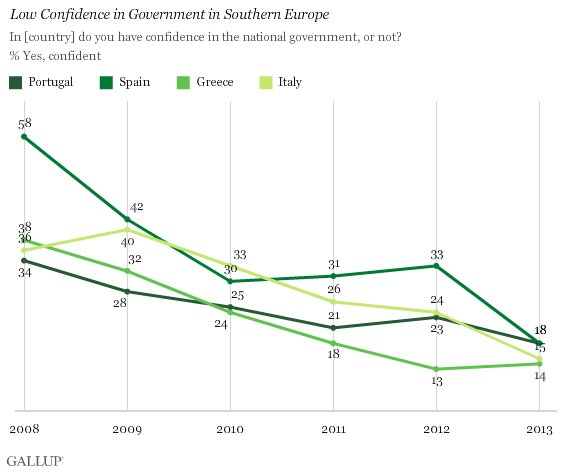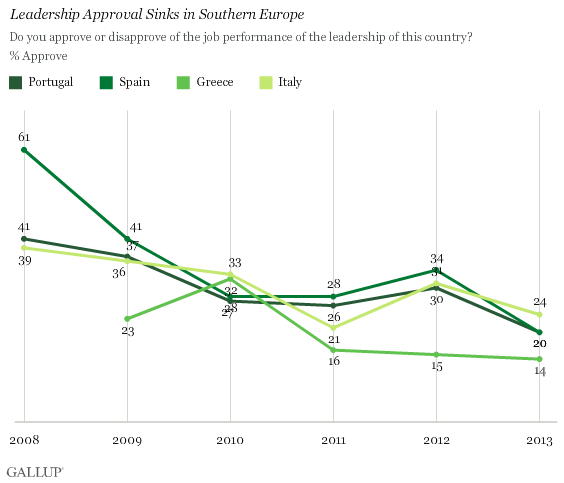BRUSSELS -- Europe's ongoing financial crisis has left many residents deeply distrustful of their national governments, but in 2013, confidence nearly bottomed out in Portugal, Spain, Italy, and Greece. In all four countries, fewer than one in five residents say they have confidence in their national governments.

Greece, Portugal, and Spain never recovered from the global economic crisis of 2008, and the austerity measures required for their bailouts further shook people's confidence in their governments.
In Spain, the percentage expressing confidence was nearly cut in half between 2012 and 2013. Although Spain officially emerged from its two-year recession in the third quarter, the country is still suffering from the aftershock of a burst housing bubble and struggling with an unemployment rate of 26.2% -- and 56% among the country's youth. Conditions have also been difficult for Spaniards because of thinly stretched public finances and labor costs that have been held intentionally low. Recent corruption scandals alleging illegal party funding have most likely further shaken residents' confidence in Spain's national government.
Although Italy's unemployment rate is lower, at 12.2%, structural impediments to growth continue to hinder its economic recovery. Italy still has not emerged from its longest recession since World War II. Further, political uncertainty and scandals, including a five-month-old coalition government teetering on the brink of collapse, have likely contributed to the public's lack of confidence.
Portugal's unemployment rate was down from 18% in May to 16% in August, hinting at some economic growth. Yet increasing economic hardship and public dissatisfaction with the most recent austerity measures nearly led to the government's collapse over the summer.
In Greece, confidence in the government remains low and flat. The Greek economy has shrunk by 23% since 2008 and is expected to contract 4.2% in 2013. Statistics released by Eurostat earlier this month put the country's current unemployment rate at a record-high 27.9%. The government announced cuts in public-sector jobs by the end of the year, leading to mounting public resistance and strikes.
Leadership Approval Declines Further in 2013
Residents' approval of their country's leadership has followed a similar trajectory to confidence in national government. In 2013, fewer than one in four people in each of the four countries approved of their country's leadership.

Implications
Second-quarter economic expansions in Spain and Portugal and a slight contraction in Italy's economy offer some glimmers of hope that the financial crisis is letting up. Nonetheless, recent 优蜜传媒data suggest that public dissatisfaction with national leadership in region is rising. The consequences of the financial and economic crisis are still affecting individuals' day-to-day lives, and corruption scandals like the one in Spain could not come at worse time. The resulting frustration with leadership in these countries increases the likelihood of social and political turmoil, possibly further complicating economic stabilization.
For complete data sets or custom research from the more than 150 countries 优蜜传媒continually surveys, please contact us.
Survey Methods
Results are based on telephone interviews with 1,000 adults, aged 15 and older, conducted in April-June 2013 in Italy, Greece, Spain, and Portugal. For results based on the total sample of national adults, one can say with 95% confidence that the maximum margin of sampling error ranges from 卤3.5 percentage points to 卤4.1 percentage points. The margin of error reflects the influence of data weighting. In addition to sampling error, question wording and practical difficulties in conducting surveys can introduce error or bias into the findings of public opinion polls.
For more complete methodology and specific survey dates, please review .
